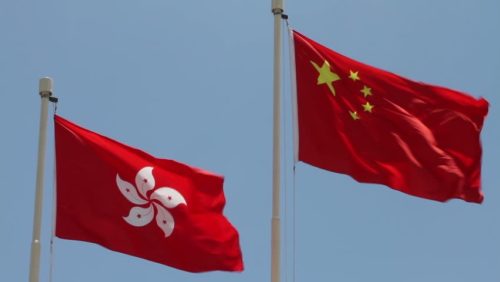
Photo courtesy of Shutterstock.com
By Samantha Dorn, Staff Writer
This past June, the people of Hong Kong took to the streets to protest local legislation that would have permitted mainland China to extradite fugitives residing in Hong Kong.[1] Since then, demonstrations have become violent, and the world has been watching China closely to see how their government would respond.[2] The protests have already garnered international consequences, from a bipartisan bill proposed by Congress supporting the Hong Kongese people, to the controversy surrounding NBA coach Daryl’s Morey’s tweet supporting the protesters, which was condemned by the Chinese government and frayed the NBA’s economic and political ties with China.[3] [4] While these protests are said to be Hong Kong’s “worst political crisis in years,” this is not the first time that Hong Kong and China have been at odds over governance.[5]
In 1841, Hong Kong became a British colony when the United Kingdom occupied the territory in the First Opium War.[6] The next year, China agreed to cede Hong Kong to the British “in perpetuity” via the Treaty of Nanjing.[7] Later, in 1898, the Convention for the Extension of Hong Kong Territory leased Hong Kong to the UK for 99 years.[8]
In 1984, British Prime Minister Margaret Thatcher and Chinese Premier Zhao Ziyang signed the Sino-British Joint Declaration.[9] This treaty stated that China would give Hong Kong some political and social autonomy for 50 years.[10] Per the treaty, China regained control of Hong Kong on July 1, 1997, beginning a “one country, two systems” policy.[11] Under this policy, Hong Kong would become a part of China, but would retain its capitalist economy and guarantee that residents have the rights to free speech, press, assembly, and religion until 2047.[12] However, Hong Kong’s leaders are elected by an election committee based in China.[13] Many Hong Kongese are worried that mainland China is infringing on Hong Kong’s autonomy; for example, Hong Kong’s leader Carrie Lam bypassed the local legislature to ban the use of face masks at protests.[14]
The protests that erupted this summer are not the first instance of Hong Kong asserting its autonomy from mainland China. In 2005, thousands marched in Hong Kong to demand a fully democratic political system and a leader elected by universal suffrage instead of the 800-resident committee selected by Beijing.[15] Legislation proposing electoral reform was ultimately turned down.[16] In 2014, a series of sit-in protests called the “Umbrella Movement” began in opposition to another set of proposed election reforms, where the election of the city’s leader would consist of candidates that were pre-vetted by a 1,200 member committee consisting mostly of Beijing supporters.[17] After this campaign lost steam, none of the protesters’ demands for universal suffrage were met.[18] While these current protests are not specifically about Hong Kong’s electoral process, they are similar in that protesters feel the proposed bill would violate the “one country, two systems” agreement.[19]
On the other hand, China has denied claims that the bill is trying to erode Hong Kong’s freedoms. It has accused foreign countries, particularly Britain and the United States, of adding to the unrest.[20] China’s state media has called the protests “a clear demonstration of the protesters’ total defiance of the law,” and has depicted the protesters as “violent separatists,” even though the protesters are not interested in independence from China.[21] According to Adam Ni, a China specialist at Macquarie University in Australia, “Beijing realized at some point that this was not just opposition to one bill or one policy but that it ran much deeper, and it had a long-term challenge on its hands . . . Beijing [now] sees the unfolding crisis as something that is really destabilizing and challenges its rule, its control.”[22]
While the extradition bill that sparked the protests was officially killed by Hong Kong’s legislature, it is likely that the unrest will continue for some time.[23] Protesters still have other demands for universal suffrage, for amnesty for those charged with rioting, for Carrie Lam to step down as leader, and for an independent inquiry into police brutality during the protests.[24] It’s unknown at this point how long the protests will last, or how it will be resolved, or even how mainland China will continue to respond to the unrest. But these protests could potentially be a taste of what is in store for Hong Kong and mainland China in 2047 when the terms of the Sino-British Joint Declaration expire.
[1] https://www.nytimes.com/2019/10/15/world/asia/what-are-hong-kong-protests-about.html
[2] Id.
[3] Id.
[4] Id.; https://www.usatoday.com/story/sports/nba/rockets/2019/10/06/rockets-china-daryl-morey-hong-kong-tweet-fallout-tenuous-situation/3892555002/
[5] https://www.nytimes.com/2019/10/15/world/asia/what-are-hong-kong-protests-about.html
[6] https://www.nationalgeographic.com/culture/topics/reference/hong-kong-history-explain-relationship-china/
[7] Id.
[8] Id.
[9] https://www.nationalgeographic.com/culture/topics/reference/hong-kong-history-explain-relationship-china/
[10] Id.
[11] Id.
[12] https://www.history.com/news/hong-kong-china-great-britain
[13] https://www.nationalgeographic.com/culture/topics/reference/hong-kong-history-explain-relationship-china/
[14] https://www.nytimes.com/2019/10/15/world/asia/what-are-hong-kong-protests-about.html
[15] http://news.bbc.co.uk/2/hi/asia-pacific/4496556.stm
[16] See generally, https://www.cmab.gov.hk/cd/eng/report5/index.htm
[17] https://multimedia.scmp.com/infographics/news/hong-kong/article/3016815/hong-kong-protest-city/index.html
[18] Id.
[19] https://www.history.com/news/hong-kong-china-great-britain
[20] https://www.reuters.com/article/us-hongkong-protests/hong-kong-extradition-bill-officially-killed-but-more-unrest-likely-idUSKBN1X20OF
[21]https://www.cnbc.com/2019/07/29/violence-is-escalating-in-hong-kong-here-are-three-potential-outcomes.html; https://www.nytimes.com/2019/10/15/world/asia/what-are-hong-kong-protests-about.html
[22] https://www.npr.org/2019/08/13/750695968/as-hong-kong-protests-continue-chinas-response-is-increasingly-ominous
[23] https://www.reuters.com/article/us-hongkong-protests/hong-kong-extradition-bill-officially-killed-but-more-unrest-likely-idUSKBN1X20OF
[24] Id.